
Get Well Soon wishes to Stacey Mason, the customary denizen of this space. She’s having a small surgical intervention to repair a running injury. Her Facebook is here.

Get Well Soon wishes to Stacey Mason, the customary denizen of this space. She’s having a small surgical intervention to repair a running injury. Her Facebook is here.
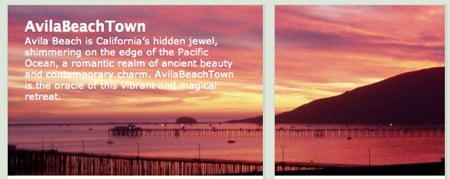
Avila Beach is a Twitter fiction that gradually unfolds with a few posts a day.
Yes, her husband is the esteemed owner of an award-winning boutique winery off See Canyon Rd., so talented and oblivious of her deception
The story is not entirely pastoral.
Inside the yacht, two lone figures sit across from one another, assuring the other that there is no other choice. Pelicans, meanwhile, dive.
The story is, it appears, being told to promote tourism in this California town. It’s an interesting genre, although the some passages (like those above) suggest that Twitter fiction needs to be very finely honed indeed if it is to appear to be natural in situ and to stand up to close reading in isolation.
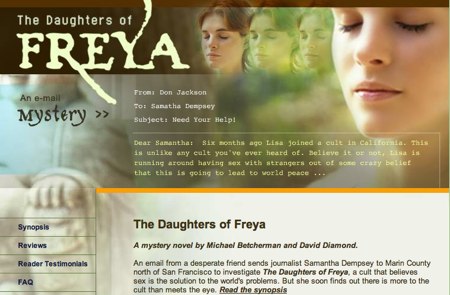
I’ve just recently started Michael Betcherman and David Diamond’s Daughters of Freya, a serial email mystery about a San Francisco cut that believes sex with strangers is the way to world peace. So far, the narrative seems promising; 4-5 emails are delivered each day over the course of the 3 weeks the story takes to unfold.
The format allows for pacing and anticipation, but can retain the author’s intended schedule no matter when the reader begins reading. If you read a serial in a magazine, and you begin while the 4th issue is in publication, the anticipation is no longer a factor for the first 3 issues. With the Daughters format however, no matter when the reader begins reading, the story will always unfold the same way in real-time. The reader can't jump ahead or cheat.
Authorial control has been debated in hypertext circles for decades, but Daughters of Freya work asserts control elegantly, chiefly because the work does not make any pretenses toward interactivity or agency. This shouldn't be remarkable, but in digital literature, it has been a surprisingly unusual approach. The work’s Web site mentions that emails do contain links to fictional webpages made specifically for the work, but I haven’t seen any of these yet.
Daughters of Freya can be purchased for $3.99, or you can sample the first 3 emails free.

YouDunnit is a 2D memory game that positions itself somewhere between a choose-your-own-adventure and a literary hypertext. The game plays out as a mystery, only backwards. You are the killer, and as you go back in time, you must remember the lies you’ve told in the future, keep them consistent, and make sure to not interrupt causality. If you’ve caused confusion with a bomb to create an alibis, you’d better make sure you pick up a bomb or make one when you get to the earlier scene.
YouDunnit, by Mark Luck, Danny Day, Rodain Joubert, and Robbie Fraser, is available for Windows XP, Vista, or Windows 7.
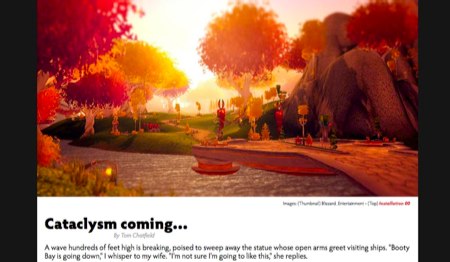
Tom Chatfield makes some interesting points about the maturation of digital entertainment in a recent article anticipating the new World of Warcraft expansion: Cataclysm.
Nostalgia and novelty have long been the two most significant forces driving interactive entertainment–and they have always tended to pull us in two different directions. Today, though, within places like World of Warcraft, they are increasingly powerfully aligned. And this inherently conservative force is already having major consequences for just for the games industry, but for digital culture at large. We play games because their miniature worlds are places where everything makes sense: where effort brings rewards, where neither we nor the place ever grows old. The little Eden of Azeroth may be about to be transformed, but in an important sense it will always also remain the same. We should be both grateful for this, and--if we believe that change and innovation are the lifeblood of the web–a little afraid as well.
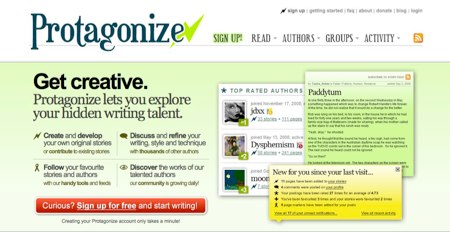
Protagonize is an online writing community that focuses on collaborative writing. Though it began as a means of writing collaborative branching narratives akin to the Choose-Your-Own-Adventure story, the site now also supports the creation of “standard stories” as well. It hopes to combine social networking with a peer-reviewed authoring community—something between Facebook and Fictionaut for writers of linear and branching narratives.
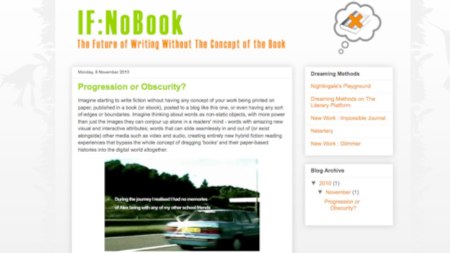
Andy Campbell of Dreaming Methods posted a nice introduction to electronic literature—great for students or those who are unfamiliar with the medium. More importantly, the piece has roused a bit of intelligent discussion in the comments.
I’m also interested to see if this blog, IF: NoBook (a direct reference to IF:Book http://futureofthebook.org ), takes off as a forum for discussion on hypertext and digital literature.
Knowledge Atlas - Spaces from Marco Quaggiotto on Vimeo.
Knowledgecartography.org offers an interesting approach to expanding knowledge representation beyond the standard visual metaphors, and they have interesting ideas on maps used for narrative tools.
Just like a text, the map makes selections on reality, distorts events, classifies and clarifies the world in order to selections better tell a particular aspect of a territory, an event, a space. When used with malice, it can hide, conceal, falsify or diminish a reality through the construction of an ideological discourse, in which the communicative aims are hidden to the user. In this context, the term ‘map’ is a synonym of visual narration of space: a cultural artefact created by an author to describe a space according to an objective.
Knowledge Cartography stems from Communication Design PhD research at the Politecnico di Milano by Marco Quaggiotto, so we should expect some interesting updates to what is already a promising idea.
The financial state of many academic institutions has led some to question the role of the humanities. In the U.K., drastic cuts have recently been proposed.
Kathryn Tomasek of the Wheaton College Digital History Project reminds us that these questions do not have to be such rigid binaries. She argues that the digital humanities provide a compromise between the advancement of the applied subjects and the liberal arts.
Many of my colleagues in humanities departments use digital tools in their teaching, and their innovative pedagogy offers students opportunities to practice the methods of their disciplines in ways that expand their exposure to skills that will be more and more necessary as digital culture develops
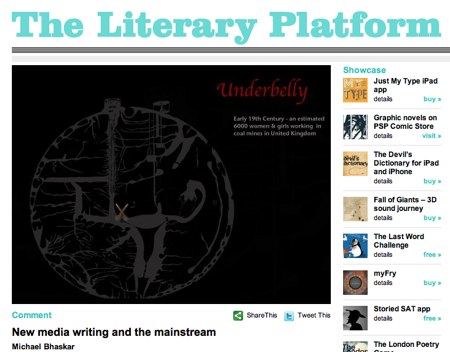
The Poole Literary Festival has selected Christine Wilks’ Underbelly for the New Media Writing Prize. Michael Bhaskar, one of the judges, gives an overview of a couple of the pieces and the diversity of the field. He writes that
Underbelly is an intense, educational, visceral experience, that delves deep into new media territory and transforms our expectations of what could be called literature. Exploring the experience of women miners in the nineteenth century the look, sound and writing of the piece are all magnificently distinctive and skillfully designed. I learned a lot “reading” and it hung around for days. This is powerful stuff.
Bkaskar underestimates how long new media literature has existed – he thinks tr(A)ce a precursor – but he makes a useful point that new media could benefit from "the market or at least reader focused approach of commercial publishing.” Of course, market-driven publishing is often deplored by writers, and is among the main reasons for having literary festivals and awards. If publishers and the marketplace made consistently sound judgments of quality, we’d simply read best-sellers and would hardly need the Booker, Pulitzer, Nobel, PEN, or Poole awards!
Congratulations to Christine Wilks!
Monica Gaudio, an aspiring food writer, recently found her article about apple pie lifted from her privately-owned domain and published in a Cooks Source, a print magazine. She assumed that a clerical mistake had been made and contacted the magazine. To her surprise, she received a curt reply from the editor which claimed that rather than meeting the writer’s requests—an apology on Facebook and in print and a $130 donation to the Columbia School of Journalism—the writer should be grateful for the exposure and editing and should in fact pay the magazine.
Yes Monica, I have been doing this for 3 decades, having been an editor at The Voice, Housitonic Home and Connecticut Woman Magazine. I do know about copyright laws. It was "my bad" indeed, and, as the magazine is put together in long sessions, tired eyes and minds somethings forget to do these things.
But honestly Monica, the web is considered "public domain" and you should be happy we just didn't "lift" your whole article and put someone else's name on it! It happens a lot, clearly more than you are aware of, especially on college campuses, and the workplace. If you took offence and are unhappy, I am sorry, but you as a professional should know that the article we used written by you was in very bad need of editing, and is much better now than was originally. Now it will work well for your portfolio. For that reason, I have a bit of a difficult time with your requests for monetary gain, albeit for such a fine (and very wealthy!) institution. We put some time into rewrites, you should compensate me! I never charge young writers for advice or rewriting poorly written pieces, and have many who write for me... ALWAYS for free!
The backlash on Facebook has been enormous, with thousands of angry individuals bombarding the magazine’s page with messages of outrage and support for writers’ rights. Griggs’ failure to apologize, condescending tone, and editorial blunders in her email all helped exacerbate anger at misappropriation of the article, creating a memorable PR debacle. In the way of a storm of Twitter and Facebook protest, the story has received extensive coverage on the Web and in print.
What fascinates me about this story is the editor’s expectations that the entire internet is “public domain.” Of course, most everyone in the publishing industry should understand copyright, but I wonder how much of the general population shares this belief. The thought is frightening.
Impressive pecha kucha short fiction by Tom Scott about a flash mob. Terrific pacing.
Teddy Smith crafts a 6-minute tour of the abandoned 6 Flags Over New Orleans amusement park.
For extra credit: how many layers of simulacra are involved here?
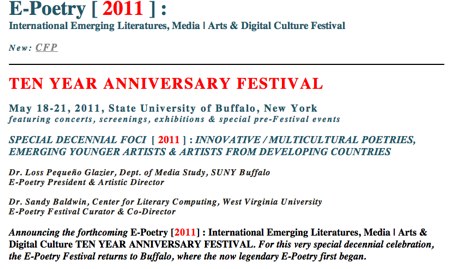
Save the date for the E-Poetry [ 2011 ] : International Emerging Literatures, Media | Arts & Digital Culture’s 10 year anniversary festival May 18-21, 2011 at SUNY Buffalo.
Festivities will include concerts, screenings, and exhibitions with an artist-oriented atmosphere.
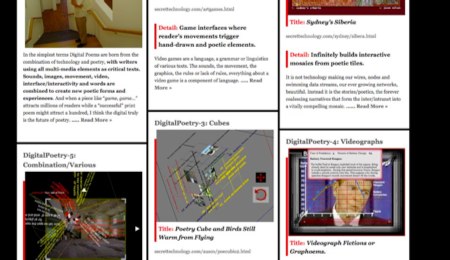
Jason Nelson offers an interesting collection of digital poetry at heliozoa.com.
Heliozoa.com is designed as a stable of sorts, for the these poetic digital horses to sleep. Readers can play within the possibilities of the electronic poem, to inspire and frighten, to allure and repel. An introduction to what poetry has become, and the imaginary lands I build to keep them in hay and away from the rain.